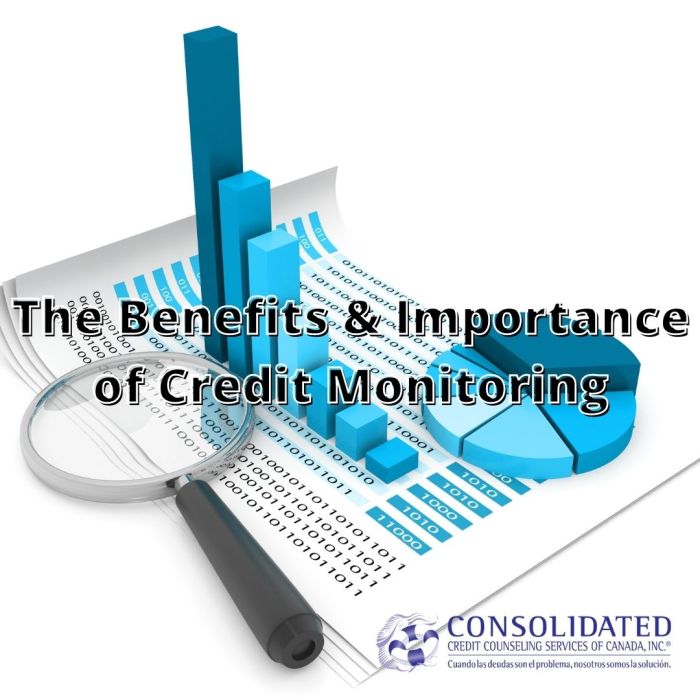With Importance of credit monitoring at the forefront, this paragraph opens a window to an amazing start and intrigue, inviting readers to embark on a storytelling journey filled with unexpected twists and insights.
Credit monitoring is like having a financial guardian angel watching over your credit score, ensuring you stay on top of your game and avoid any financial curveballs. Let’s dive into the world of credit monitoring and discover why it’s a crucial tool in today’s financial landscape.
Importance of Credit Monitoring
Credit monitoring is essential for maintaining good financial health. It involves keeping track of your credit reports and scores to ensure accuracy and detect any suspicious activity.
Significance of Credit Monitoring
Regular credit monitoring can help individuals in various ways:
- Identifying and correcting errors on your credit report, which can improve your credit score.
- Alerting you to any unauthorized activity or potential identity theft, allowing you to take action promptly.
- Helping you track your progress in building or maintaining a good credit score over time.
Consequences of Not Monitoring Credit
Failing to monitor your credit regularly can lead to:
- Missed errors on your credit report that could negatively impact your credit score.
- Delayed detection of identity theft or fraudulent activity, resulting in financial losses or damage to your credit history.
- Difficulty in qualifying for loans, mortgages, or credit cards due to inaccuracies or unauthorized accounts on your credit report.
Benefits of Credit Monitoring Services
Using credit monitoring services can provide individuals with a range of benefits to help protect their financial well-being and identity.
1. Early Detection of Suspicious Activity
Credit monitoring services can alert individuals to any unusual activity on their credit report, such as new accounts opened in their name or unauthorized inquiries, allowing them to take immediate action to address potential fraud.
2. Identity Theft Protection
By monitoring credit reports regularly, individuals can detect signs of identity theft early on and prevent further damage to their credit history and financial reputation.
3. Credit Score Improvement
Monitoring credit reports can also help individuals track their credit score over time and make informed decisions to improve their creditworthiness, such as paying bills on time and reducing credit card balances.
4. Peace of Mind
Having a credit monitoring service in place can provide individuals with peace of mind knowing that their credit information is being monitored round the clock, reducing the stress and anxiety associated with potential identity theft or fraudulent activity.
How to Monitor Credit Effectively
Monitoring your credit effectively is crucial for maintaining financial health and security. By following these steps, you can set up a system to keep track of your credit status and protect yourself from identity theft and fraud.
Setting Up Credit Monitoring
- Sign up for a reputable credit monitoring service to receive regular updates on your credit report and score.
- Provide accurate personal information to ensure that the monitoring service can track any changes or suspicious activity.
- Set up alerts for any significant changes in your credit report, such as new accounts opened or a sudden drop in your credit score.
- Regularly review your credit reports from all three major credit bureaus – Equifax, Experian, and TransUnion – to check for errors or discrepancies.
Interpreting Credit Reports and Score Fluctuations
- Understand the factors that affect your credit score, such as payment history, credit utilization, length of credit history, new credit accounts, and credit mix.
- Look for any inaccuracies in your credit report, such as accounts that don’t belong to you or incorrect personal information.
- Monitor your credit score regularly to track any fluctuations and identify the reasons behind them, whether positive or negative.
- Utilize resources provided by credit monitoring services to help you understand your credit report and score better.
Creating a Monitoring Routine
- Schedule regular check-ups on your credit reports, at least once a month, to stay informed about any changes or potential issues.
- Keep track of your credit utilization ratio and strive to keep it below 30% to maintain a healthy credit score.
- Review your credit card and bank statements regularly to detect any unauthorized charges or suspicious activity.
- Stay proactive in addressing any discrepancies or fraudulent activity by contacting the credit bureaus and reporting the issue promptly.
Importance of Early Detection through Credit Monitoring

Early detection through credit monitoring is crucial because it allows individuals to catch errors or suspicious activities on their credit reports before they escalate into bigger issues. By identifying and addressing these issues early on, individuals can prevent financial losses and protect their credit score.
Preventing Financial Losses
One example of how early detection through credit monitoring has helped individuals prevent financial losses is by catching fraudulent charges on their credit cards. By monitoring their credit reports regularly, individuals can spot unauthorized transactions quickly and take action to dispute them, preventing further losses.
Identifying Signs of Identity Theft
Credit monitoring plays a crucial role in identifying signs of identity theft early on. For instance, if someone opens a new credit account using another person’s information, credit monitoring can alert the individual to this activity. By detecting identity theft early, individuals can take steps to report the fraud and minimize the damage to their credit history.
